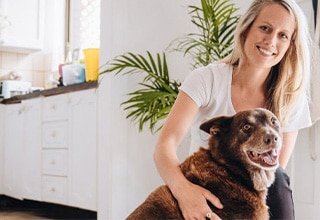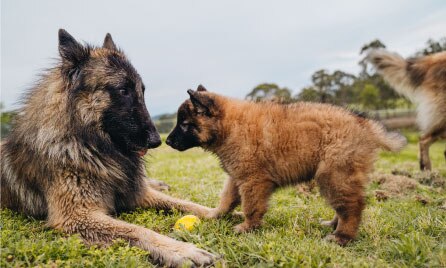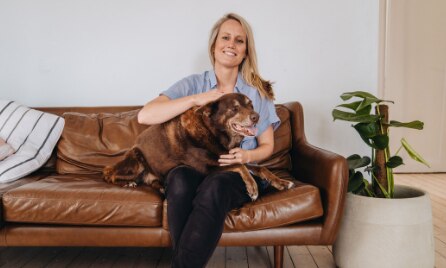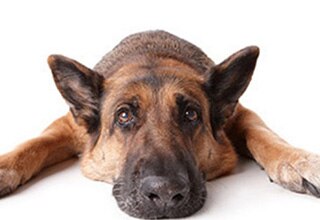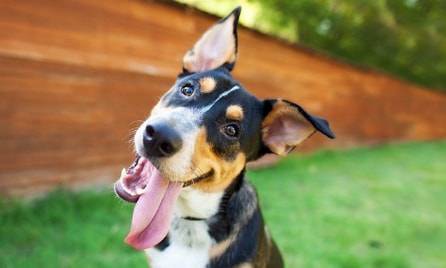- text
-
† Offer available to new Everyday Pet Insurance policyholders, and is limited to 1 membership per eligible policy. The free membership offer (valued at $199p.a) is from the date of your policy commencement, provided your Everyday Pet Insurance policy remains active. You are not eligible to redeem the free membership subscription for cash or credit. VetAssist is a separate subscription based service to the Everyday Pet Insurance product, and is provided independently by Everyday Insurance third party service provider, VetChat Services Pty Ltd (VetChat). Click here for full VetAssist Service terms and conditions. Everyday Insurance reserves the right to vary or remove this offer at any time and will provide reasonable notice of any such changes.
How to help your puppy sleep through the night.
Becoming a carer to a new puppy is such an exciting time. However, it’s also mega intensive and more challenging than many realise: just like a real baby, puppies need lots of extra love and support. Don’t forget - from a pup’s perspective, this is the biggest change of their life. They’ve just been uprooted from their litter mates, the only home they have known.
Now, more than ever, they need to feel loved and supported. So what can you do to help?
1. Provide a safe place to sleep.
Before night one, have a think about where your puppy will sleep. Ideally, they need draft-free bedding in a quiet place that feels secure. Low radio or a night light can help too, even the sounds from a clock. If inside, having your pup nearby also means you can be more responsive to potty requests to help with toilet training too! Depending on where they are you may need to provide pee pads.
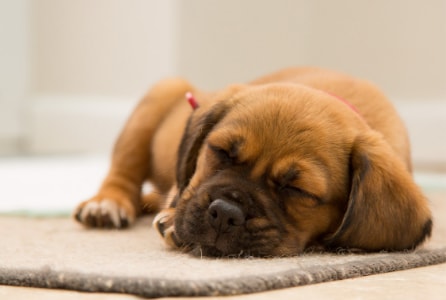
2. Be calm.
Be patient, remember to reward calm behaviour and try not to be frustrated with those middle-of-the-night wakings. They won’t last. Before you know it, you’ll have a happy pup that can sleep right through the night and hold their bladder until morning.
3. Gentle toilet training from day one.
Some pups will get it within a few days, while others can take months. The key is to be patient and consistent. Start by following these tips:
Prevent accidents in the house by providing plenty of time outside.
For inside time, have a designated potty spot set up and let your puppy get familiar with it.
Watch your puppy like a hawk: as soon as they start showing you signs they want to pee (i.e. sniffing, restlessness––you’ll get to know them), take them straight to their spot.
Repeat this hourly, especially after eating, drinking or sleeping
Keep potty trips at night calm: speak in low, quiet tones and stand with them for support (don’t let this be playtime).
Reward, reward, reward. Do it straight away too, so they know what they’re being rewarded for
Ignore accidents, even if you see them in the act. Fur kids (like human kids) can’t always prevent going to the loo. It’s all part of growing up.
4. Help being left alone.
It’s really natural for a young puppy to object to being left alone early on. Especially if they’ve been with mum and all their litter mates then suddenly they’re all alone.
It’s important to realise for a new puppy, if they are crying when left alone it is a sign of genuine distress and anxiety. If left, it can be detrimental to your pup’s mental health long-term.
They need your help to learn to be happy and relaxed when they are on their own. So if they need to have one paw touching you to fall asleep, let them. It’ll only be for a little while. The safer and more comfortable you can make them feel now, the more relaxed they’ll be as they grow up.
Related articles.
Please note: Not all conditions, vet visits and treatments are covered by Everyday Pet Insurance. Refer to the Product Disclosure Statement for details of coverage.
- text
-
Everyday Pet Insurance policies entered into for the first time prior to 17 July 2023 and subsequent renewals of those policies are issued by The Hollard Insurance Company Pty Ltd ABN 78 090 584 473, AFSL 241436 (Hollard), arranged and administered by PetSure (Australia) Pty Ltd ABN 95 075 949 923, AFSL 420183 (PetSure) and promoted and distributed by Hollard’s Authorised Representative (AR) Woolworths Group Limited ABN 88 000 014 675, AR 245476 (Woolworths). Everyday Pet Insurance policies entered into for the first time on or after 17 July 2023 and subsequent renewals of those policies are issued by PetSure and promoted and distributed by PetSure’s AR, Woolworths. Any advice provided is general only and does not take into account your individual objectives, financial situation or needs. Please consider the Product Disclosure Statement (PDS) to ensure this product meets your needs before purchasing, or choosing to continue with the product. PDS and Target Market Determination available at insurance.everyday.com.au/pet-insurance.
